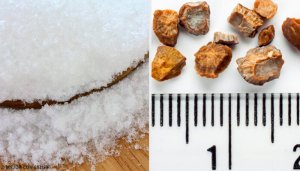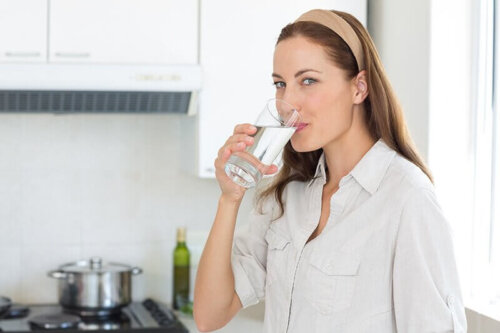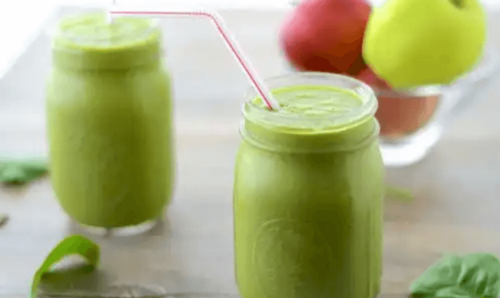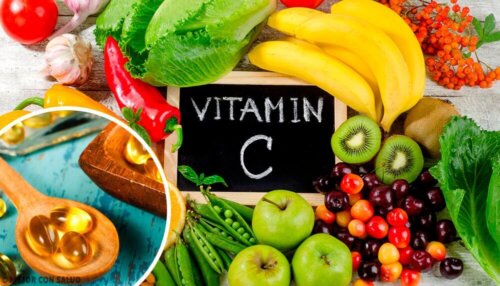7 Home Remedies to Get Rid of Kidney Stones

Kidney stones are hard deposits of salts and minerals that form inside the kidneys and you should try to get rid of them. This is because the often affect the urinary tract, from the kidneys to the bladder. These stones usually form when urine becomes too concentrated and minerals crystallize and bind together.
Expelling kidney stones can be quite painful to those who aren’t properly hydrated and neither follow treatment nor maintain a healthy lifestyle.
However, when detected early and treated in a timely manner, you can expel them without much discomfort or permanent damage.
Generally, treatment consists of drinking water (to dissolve the stones and facilitate their expulsion through urine), eating a balanced diet, not overindulging and, in some cases, taking painkillers to relieve discomfort.
If your doctor has told you that you have kidney stones, then, follow their instructions. Furthermore, depending on the type of stone, you’ll need to make some adjustments to your diet.
It’s generally recommended that patients with stones avoid the following:
- Salt
- Sugar
- Eggs
- Organ meats
- Shellfish
- Red meat
- Dairy products
- Refined flours
- Alcoholic beverages
- Industrial beverages (flavored waters, infusions, teas, juices, soft drinks and related)
Natural remedies to expel stones from the kidneys
Here are some natural remedies that can help you to expel kidney stones more easily.
1. Water, the best remedy to expel kidney stones

Water is the simplest most effective remedy to try to get rid of kidney stones. Be sure to drink according to your thirst, but if you see that you don’t even get two glasses a day, consider setting a couple of alarms on your cell phone to start drinking at least four-5=five.
2. Horsetail
Horsetail is a medicinal plant with diuretic properties that stimulate kidney function and also help control inflammation and discomfort associated with fluid retention.
To take advantage of its health properties, you can take it for periods of four to six weeks at most. You can have it as an infusion (the most recommended option) or in capsules.
Moreover, take it under the supervision of a health professional since its active ingredients may interact with other medications or lead to side effects. In addition, don’t use it of you have chronic kidney disease, heart disease, gout, or diabetes.
3. Mixed natural juices
Fresh juices made with water-rich vegetables and fruits (watermelon, tomato, melon, grapefruit and such) can hydrate you and support kidney function. Be sure to try several blends to find the one you like the most and come up with your own versions.
The apple, oatmeal and cucumber blend is a good combination to start with.

4. Vegetable drinks
Another way to ensure proper hydration is to drink broths and vegetable drinks (preferably natural, without added sugar). This is because they’re light and usually provide nutrients that can benefit the health of your whole organism beyond the renal system.
5. Foods with vitamin C

Vitamin C must be part of a well-balanced diet. It keeps stones from solidifying and facilitates their gradual elimination. Some good sources of it are:
- Kiwi
- Parsley
- Acerola (Malpighia emarginata)
- Guava
- Red berries
- Rosehip
6. Lemonade
Following a lemonade treatment offers benefits in total urine volume and citrate present in urine. According to this study published in the journal Urology, it’s a good complement to potassium citrate therapy.
Check out these 8 Symptoms of a Vitamin C Deficiency
7. Local heat
To facilitate the expulsion of kidney stones and soothe any discomfort or pain in the area, you can apply localized heat in any of its possible forms.
In addition, you’ll be surprised by the great relaxing effect of this simple remedy you can take advantage of every night before bedtime.
Other home remedies for kidney stones: pomegranate juice
The juice of this fruit has been traditionally used to treat multiple kidney and urinary problems. Its action is largely due to the presence of anthocyanins, alkaloids, and polyphenols with a high antioxidant capacity.
Thus it’s possible to prevent the formation of stones and relax the muscles of the urinary tract, which could facilitate the expulsion of stones.
Nettle infusion to get rid of kidney stones
This plant is often used in the treatment of all types of renal and urinary pathologies. Its active principles prevent the deposition of calcium and oxalate and the subsequent growth of crystals.
As pointed out by the authors of the above-mentioned study in the International Journal of Molecular Sciences, trials on mice back said claim.
Above all, maintain a healthy lifestyle to relieve kidney stones
Remember that the process of eliminating kidney stones may take time, so be patient. Follow your doctor’s recommendations, drink plenty of water and, above all, maintain a healthy lifestyle. You’ll see how you improve and attain long-term wellness.
In any case, seek immediate medical attention if you experience severe pain in the lower abdomen or genitals as well as vomiting, nausea, blood in the urine, pain when urinating, or loss of consciousness. Also keep in mind that, before taking any medicinal plant, it’s always best to consult your doctor.
All cited sources were thoroughly reviewed by our team to ensure their quality, reliability, currency, and validity. The bibliography of this article was considered reliable and of academic or scientific accuracy.
- Asociación Española de Urología. (S.F.). Recomendaciones dietéticas para pacientes con hipocitraturia. Consultado el 23 de julio de 2024.
- Clínica Mayo. (2022). Cálculos renales. Consultado el 23 de julio de 2024. https://www.mayoclinic.org/es/diseases-conditions/kidney-stones/symptoms-causes/syc-20355755
- Fundación Nacional del Riñón de los Estados Unidos. (S.F.). La Dieta y los Cálculos Renales. Consultado el 23 de julio de 2024. https://www.kidney.org/es/atoz/content/diet
- Fundación Nacional del Riñón de los Estados Unidos. (S.F.). Sustitutos de la leche. Consultado el 23 de julio de 2024. https://www.kidney.org/es/atoz/content/sustitutos-de-la-leche
- García, H., Benavidez, P., Posada, P. (2016). Fisiopatología asociada a la formación de cálculos en la vía urinaria. Urología Colombiana, 25(02), 109-117. https://www.elsevier.es/es-revista-urologia-colombiana-398-articulo-fisiopatologia-asociada-formacion-calculos-via-S0120789X16000046
- Instituto Nacional de la Diabetes y las Enfermedades Digestivas y Renales de Estados Unidos. (2017). Definición e información sobre las piedras en los riñones. Consultado el 23 de julio de 2024. https://www.niddk.nih.gov/health-information/informacion-de-la-salud/enfermedades-urologicas/piedras-rinones/definicion-informacion
- Instituto Nacional de la Diabetes y las Enfermedades Digestivas y Renales de Estados Unidos. (2017). Tratamiento para las piedras en los riñones. Consultado el 23 de julio de 2024. https://www.niddk.nih.gov/health-information/informacion-de-la-salud/enfermedades-urologicas/piedras-rinones/tratamiento
- Jalal, S. M., Alsultan, A. A., Alotaibi, H. H., Mary, E., & Alabdullatif, A. A. I. (2020). Effect of Phaseolus Vulgaris on Urinary Biochemical Parameters among Patients with Kidney Stones in Saudi Arabia. Nutrients, 12(11), 3346. https://www.ncbi.nlm.nih.gov/pmc/articles/PMC7692137/
- Mason, P. (2014). Thermotherapy and cryotherapy. The Pharmaceutical Journal. Consultado el 23 de julio de 2024. https://pharmaceutical-journal.com/article/ld/thermotherapy-and-cryotherapy
- Nirumand, M. C., Hajialyani, M., Rahimi, R., Farzaei, M. H., Zingue, S., Nabavi, S. M., Bishayee, A. (2018). Dietary Plants for the Prevention and Management of Kidney Stones: Preclinical and Clinical Evidence and Molecular Mechanisms. International journal of molecular sciences, 19(3), 765. https://www.ncbi.nlm.nih.gov/pmc/articles/PMC5877626/
- Ordaz, J., Alonso, M.A. (2022). Uso de medicamentos tradicionales a base de plantas en pacientes con litiasis renal. Ediciones Mayo.
- Salgado, L. (2021). Fitoterapia como terapia adyuvante en la litiasis renal. VII Jornada Provincial de Medicina Natural y Tradicional. https://www.researchgate.net/publication/362907429_Fitoterapia_como_terapia_adyuvante_de_la_litiasis_renal
- Susaeta, R., Benavente, D., Marchant, F., Gana, R. (2018). Diagnóstico y manejo de litiasis renales en adultos y niños. Revista Médica Clínica Las Condes, 29(02), 197-212. https://www.elsevier.es/es-revista-revista-medica-clinica-las-condes-202-articulo-diagnostico-manejo-litiasis-renales-adultos-S0716864018300270
- Stiani, S. N., Syahidah, F. M., Fikriani, H., Subarnas, A., Rusdiana, T. (2019). Anticalculi Activity of Apigenin and Celery (Apium graveolens L.) Extract in Rats Induced by Ethylene Glycol-Ammonium Chloride. Journal of pharmacy & bioallied sciences, 11(Suppl 4), S556–S561. https://www.ncbi.nlm.nih.gov/pmc/articles/PMC7020841/
- Singh, A. S., Singh, A., Vellapandian, C., Ramaswamy, R., & Thirumal, M. (2023). GC-MS based metabolite profiling, antioxidant and antiurolithiatic properties of apple cider vinegar. Future science OA, 9(4), FSO855. https://www.ncbi.nlm.nih.gov/pmc/articles/PMC10116371/
This text is provided for informational purposes only and does not replace consultation with a professional. If in doubt, consult your specialist.








